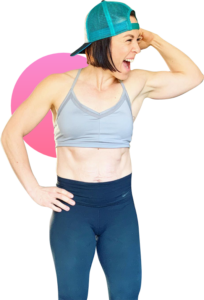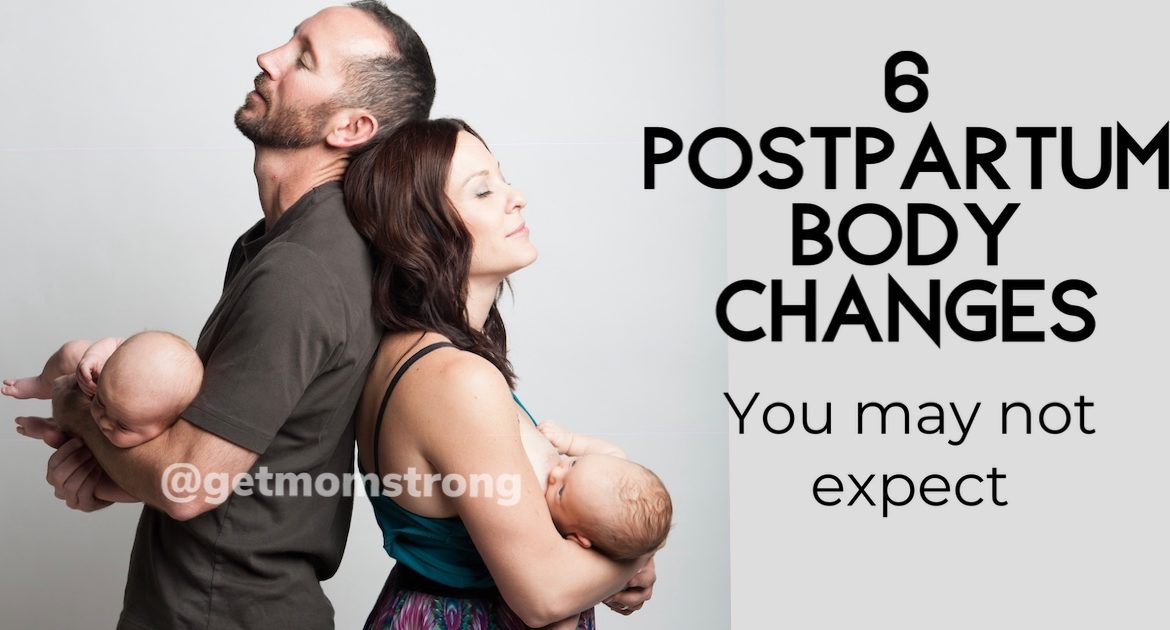As a Pregnancy and Postpartum Corrective Exercise Specialist helping women heal their postpartum bodies, I’ve heard a lot of stories. But no matter the story I’ve been told, it always ends with, “Why didn’t anyone tell me this?” Too often, we are blindsided by the postpartum process and what has become of our bodies, and as a result we are lost and unsure of how to resolve these issues. While we don’t want to instill fear in moms-to-be, it is important to empower and educate women on the changes that can occur postpartum. When we sit in silence, we think the problem is ours alone. The truth is, 2 out of 3 women experience postpartum “side effects.” Let’s talk about a few common postpartum body challenges.
1. The 6-week postpartum check-up doesn’t cover ALL the things.
You may be anxious to get back to working out. I get it. I SO get it. Perhaps you have been hanging your hat on that six-week check where women typically get cleared for exercise. The issue is, many practitioners don’t take a whole-body approach, or give great guidelines on returning to exercise the right way. Your practitioner will check to make sure your uterus has returned to size, and that your incision from a c-section is healing. They will likely also check on vaginal tearing or other external injuries to be sure they have resolved. That is all very important, but also, there is a whole host of things that are left unaddressed.
It is also important to understand what is going on internally with the pelvic floor, as well as with your abdominal muscles. Do you have prolapse, an abdominal “separation”, bladder urgency, leaking of urine or feces, a tight or weak pelvic floor? Many practitioners don’t look beyond the exterior.
Go see a pelvic floor physical therapist after your six-week check. A pelvic floor physical therapist can address all those missing links in postpartum care.
2. You will likely need to rehab your body.
When you get cleared for exercise at that six-week check, you will likely be told you can return to all activities. But how you train in those early postpartum days makes a HUGE impact on your long-term recovery. For example–sit ups, full planks, running, and other high-impact workouts aren’t ideal as a starting point. The pelvic floor and core need some foundational work first. Don’t get me wrong. You can workout hard, but you also need to workout SMART. Check out the Strong Like A Mother program. It is challenging, but mindful. The program starts by teaching you the boring (but super important) core connection work, and then mindfully takes you into total-body, sweat-inducing workouts!
Birth is a sporting event, and often, women don’t get to the finish line without some degree of injury to the body. So why don’t we treat it as such? I have some theories, but I’ll save you the rant. Your body just underwent something really amazing, and also really shocking and hard. It is of utmost importance to take the time to rehabilitate and heal from the inside…out. Take the time to rehab…it pays long term! You are only as strong as the foundation you lay!
3. “Bouncing back” doesn’t happen over night…or sometimes ever.
You grew a human (or a few!). Your body stretched and opened itself to life. It took you nine months to create each glorious human. You can’t expect to birth that baby and then instantly bounce back. As mentioned above–you can absolutely rehab your body and get super functional and strong again (don’t let anyone tell you otherwise!). But for many women, our bodies are different. Our hips are wider. We have stretch marks and loose skin. Expecting to look like a cover girl a few weeks after birth isn’t realistic or healthy. Focus on the healing and the function, and the rest will follow.
4. You don’t always lose weight while breastfeeding.
Shocking, I know.
Yes, you burn calories while breastfeeding, but it doesn’t necessarily mean the weight will just fall off. Hormones and lack of sleep also play a huge role in satiation and hunger signals. So don’t beat yourself if you hang on to a few pounds while you breastfeed. The hormonal shifts also may delay the full potential in healing Diastasis Recti and prolapse, and can also contribute to painful sex. Give this a quick read to better understand why.
5. You may lose your butt. But you can find it again!
So many women complain after having babies that they “lost their butt.” It is a common issue. During pregnancy, as the weight of the belly grows, many women seek stability by gripping their glutes tight. Postpartum–when the core is particularly compromised–the gripping becomes a way of survival. This constant butt-gripping not only creates “pancake ass”, but it is actually not good for your pelvic floor. In my Strong Like A Mother program, we focus A LOT on glute and core training–the natural antidote to “mom butt.” In addition to strengthening your glutes and core for true body stability, it is also important to mentally stop the habit of gripping. How do you do this? Grip your butt tight and then relax it. Do this throughout the day. Sometimes you don’t even realize you are doing, but this is a great way to start tuning it. Just cue yourself…”butt check?” Also, notice times during your day when you do it most. Maybe while doing the dishes, or rocking the baby while standing. If you grip and release it, then you cue your mind to let go!
6. You may need to go up a shoe size.
Most women aren’t shocked when they need new jeans after a baby, but many didn’t know that they’d possibly be in the market for new shoes, too. After my twins, I had to throw away so many shoes! So what is at play? That hormone relaxin strikes again! This is the hormone we make from ovulation through breastfeeding, and we make it to loosen the joints around the pelvis so baby can make his way down the birth canal. Well played, body. But this same hormone also loosens the ligaments in your feet, causing the foot bones to spread.
 You are a warrior.
You are a warrior.
Moms are warriors! Pure warriors. I know it can be hard to celebrate and appreciate your postpartum body when you feel so frustrated and experience so many changes all at once. Know that you WILL feel like yourself again. You CAN get strong. You CAN heal. Knowing where to start it the first step.
